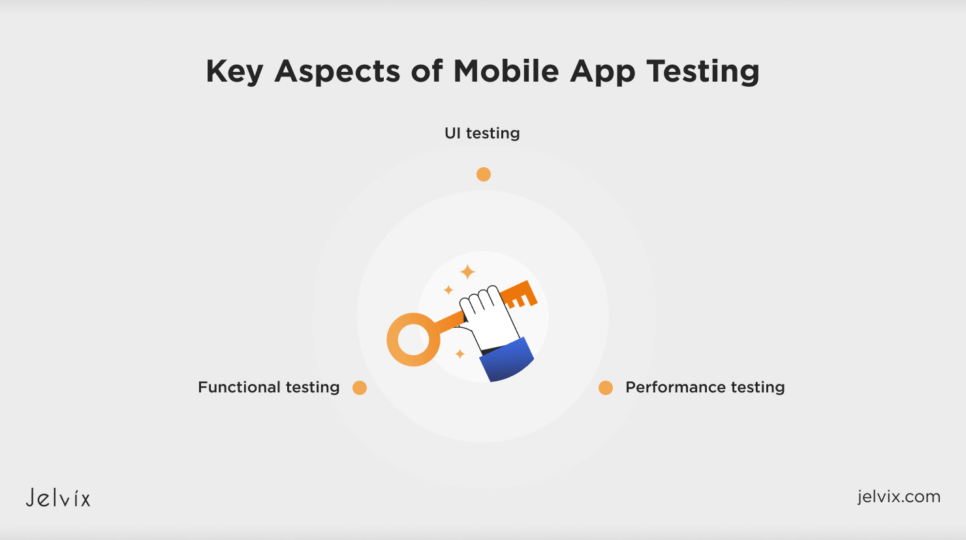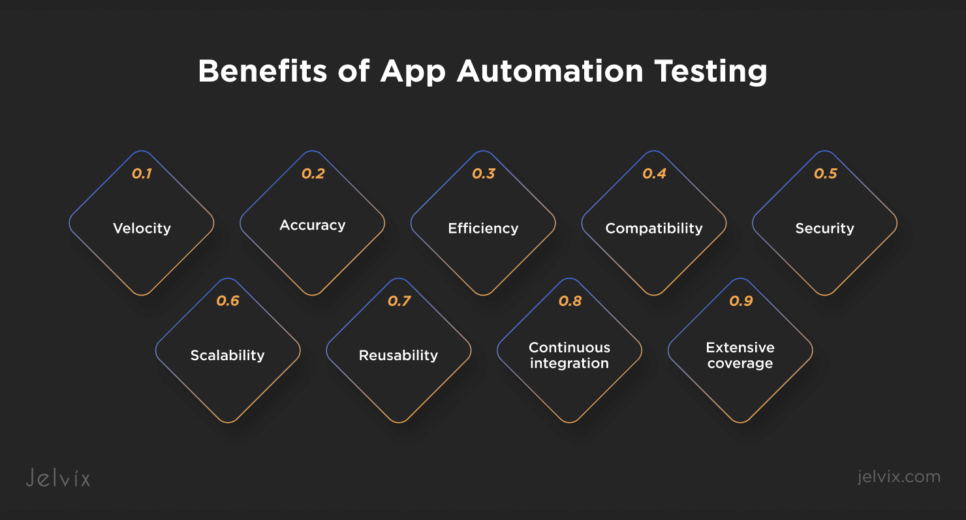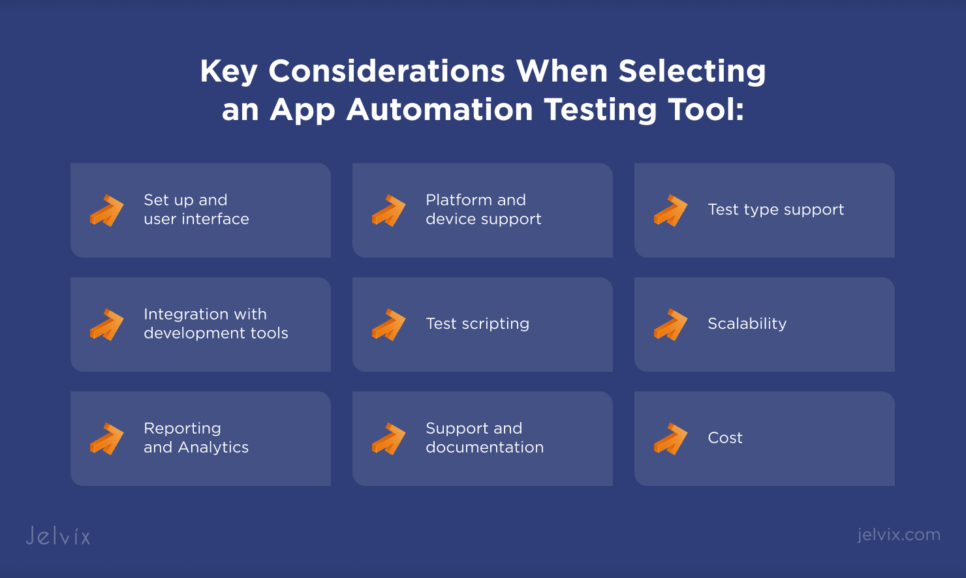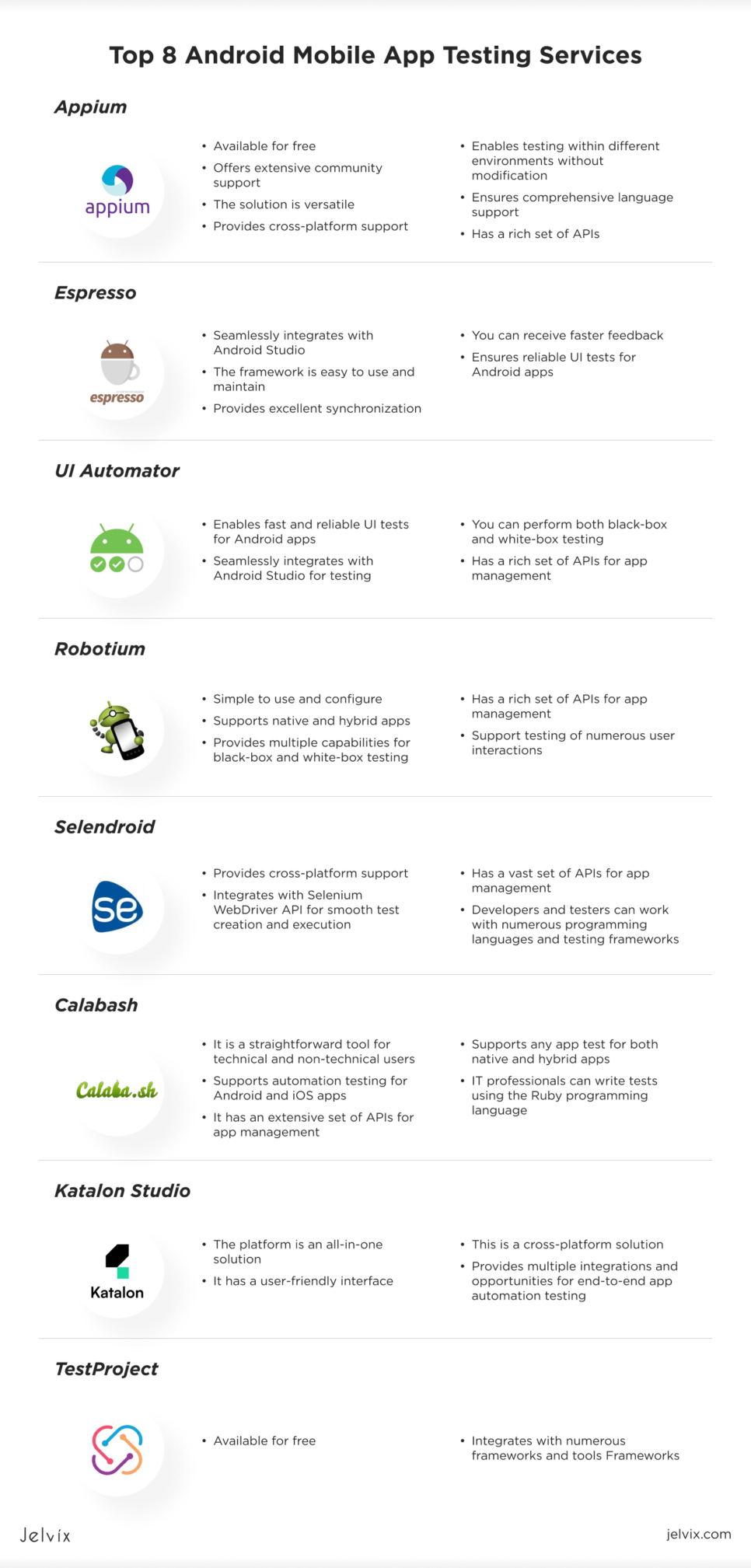Android app testing emerged almost simultaneously with Android app development in the mid-2000s. The first Android software development kit (SDK) was released in 2008. QA engineers tested the first Android apps manually, installing them on different devices and executing tests to identify issues and bugs. By that period, the number of such apps was relatively small. Since then, everything has changed.
According to Statista, the global number of app downloads has reached 257 billion. Techcrunch informs that the Google Play Store contains over 3.7 million apps, while the Apple App Store has 1.7 million.
The number of apps downloaded yearly increased by 82% between 2016 and 2022. The most significant market share belongs to apps with Android operating systems: 69.9%, while iOS has 29.3% and there are 0.7% others.
Now, could you imagine if developers and testers were still using manual testing? The emergence of automation testing tools was an inevitable result of the whopping number of Android apps that are developed every year. This is the key reason why the global testing market can reach $109.5 billion in 2027.
Of course, the question is not only about quantity but also about quality. 71% of uninstalled apps incur due to crashes. This means that you need to stick to a diligent approach while selecting a robust Android app automation testing tool.
This article discusses the best Android app automation testing tools. We will also reveal what Android app automation testing is, the benefits of automation testing tools, and what you need to consider while choosing the relevant automation testing framework for your project.
So, let’s uncover the basics, starting from the meaning of Android app automation testing.
Understanding Android App Automation Testing
Android automation testing is a process of testing Android applications using specific automation testing tools. Developers launch test scripts to check apps’ performance and functionality. They use different tools and frameworks to develop and execute scripts that mimic user interactions like tapping, swiping, entering text, touching, and navigating screens.
In the end, such testing is aimed at researching the following aspects of mobile applications:
- Functional testing: Ensures the standard work of features and components;
- UI testing: Checks if a mobile application is user-friendly and intuitively comprehensive for a user;
- Performance testing: Developers and testers estimate app resource usage, operations stability, and responsiveness under different conditions.
Benefits of App Automation Testing
The primary goal of mobile app quality assurance is to identify any bugs, mistakes, and performance-lagging issues. But what can automation testing offer?
Let’s find out the essential benefits of app automation testing beyond the core objectives of testing. You can read about them below:
- Velocity: IT specialists launch tests that work faster, provide quicker feedback on changes, and speed up the development process;
- Accuracy: Unlike manual testing, automated testing avoids errors and inaccuracies occurring due to the human factor;
- Efficiency: Higher speed of testing results in considerable time and effort reduction if you compare it with manual testing;
- Compatibility: Automated testing ensures the same performance across various Android versions and devices;
- Security: Safeguards sensitive user data and secures app integrity;
- Scalability: Automation testing is an ideal choice for covering the testing of apps with comprehensive functionality. It can effortlessly scale to deal with significant and complicated test suites;
- Reusability: Test scripts are applicable for different app versions, ensuring that new source code changes don’t affect previously fixed bugs during regression testing;
- Continuous integration: Automation testing can be seamlessly added to the CI/CD process, leading to quicker issue identification, addressing them early in the development cycle, and enhancing the app release;
- Extensive coverage: Using automation testing, QA experts can run tests of different app components and functionalities, such as UI/UX app features, their functional behavior, and compatibility across various operating systems, versions, and devices.
Key Considerations When Selecting an App Automation Testing Tool
What features and aspects of automation testing tools are essential for a seamless development process? Let’s reveal the automation tools specifics that you need to pay attention to below:
- Set up and user interface: The setup process should be effortless for any developer or tester. Testing tools should have a convenient user interface that allows the efficient creation and running of test scripts;
- Platform and device support: Consider those testing frameworks that support mobile platforms such as Android and particular devices necessary for testing. Ensure that the tool has the relevant emulators or physical devices to test;
- Test type support: Check if the tool allows the types of testing you need, such as functional, performance, or security testing;
- Integration with development tools: It is essential to choose the automation testing solution that seamlessly works with the development tools you use, like the IDE, build systems, version control, project management apps, and CI/CD pipelines;
- Test scripting: Developers and testers use a straightforward and flexible scripting language to write test scripts rapidly and efficiently. Therefore, seek the platform that enables the usage of the scripting language you like;
- Scalability: The tool that can assist in performing large-scale tests across numerous devices and app configurations is an excellent choice for a QA expert;
- Reporting and Analytics: Search those automation testing frameworks that provide extensive reporting and analytics features. They help track your progress and test results, quickly identify issues, and monitor your app quality;
- Support and documentation: Availability of support and documentation for users is also vital. Check if the solution offers setup instructions, guidance, troubleshooting resources, and usage documentation for automatic testing at any stage of testing;
- Cost: Assess the tool’s pricing to see if it aligns with your budget. Consider all possible expenses that can come along the way when choosing the platform.
Check out software development methodologies useful tips for the long life of your mobile application.
The 8 Best Android App Automation Testing Tools in 2024
Now, you can discover the top eight Android app automation testing tools in 2024. The information about Android app automation testing solutions can help you select the relevant testing tool. So, here they are.
1. Appium
Overview:
Appium is an open-source, cross-platform automation testing framework for testing apps developed by Dan Cuellar in 2011. Initially, it was named iOSAuto.
Appium is a flexible tool compatible with Android, iOS, and Windows platforms. QA specialists can use the same API code for testing in environments such as Android or iOS, saving considerable time and effort.
Appium allows testers to run scripts using numerous programming languages, such as Java, JavaScript, PHP, Ruby, C#, and Python. QA professionals can run tests in parallel using Appium Grid. The framework has an Appium Inspector interface for inspecting and interacting with apps’ features across Android, iOS, and Windows operating systems.
Key Features:
- Supports iOS, Android, and Windows;
- Supports native and hybrid apps;
- Works with emulators and real devices;
- Enables using multiple programming languages like Java, JavaScript, Ruby, Python, etc.;
- Ensures element interaction with Appium Inspector;
- Enables parallel test execution with Appium Grid;
- Provides integration with CI/CD technologies and other testing frameworks and platforms;
- Access to backend APIs and databases.
Pros
- Available for free;
- Offers extensive community support;
- The solution is versatile;
- Provides cross-platform support;
- Enables testing within different environments without modification;
- Ensures comprehensive language support;
- Has a rich set of APIs.
Cons
- Specialists claim that the initial setup is complex;
- You can encounter performance issues with considerable test suits.
2. Espresso
Overview:
Espresso is an open-source app automation testing tool developed by Google. It was created for Android app developers to test user interfaces. Espresso supports only Android UI tests and Android functionalities. IT specialists appreciate its flexibility, robustness, and simplicity.
This testing framework enables quick and reliable test execution, which gives QA experts rapid feedback on their application performance. Espresso has such capabilities as synchronized test executions, intent validations, and functionality to run recipes.
Espresso allows developers and QA to test native Android and hybrid web views. It can create test scripts in Java and Kotlin. Espresso enables both individual component testing during development cycles and black-box testing.
This framework has a user-friendly API, which is a good choice for beginners and freelance Android app developers.
Key Features:
- Free, open-source solution;
- Supports numerous Android versions and devices;
- Ensures fast and reliable test execution;
- Enables automated UI testing;
- Has synchronization capabilities to run sync tests;
- Intent validation that assists in-app interactions with other application components and applications;
- Provides a user-friendly API;
- Supports unit and black-box testing;
- Ensures Java and JUnit support for native apps.
Pros:
- Seamlessly integrates with Android Studio;
- The framework is easy to use and maintain;
- Provides excellent synchronization;
- You can receive faster feedback;
- Ensures reliable UI tests for Android apps.
Cons:
- Available only for Android;
- Supports a limited number of programming languages;
- Enables support for Android API level 15 and above only;
- Testing of complex UI components and animation can be challenging.
3. UI Automator
Overview:
UI Automator is an open-source solution presented by Google. It was designed for testing Android applications. UI Automator supports black-box testing. This tool can emulate real user actions with an app, including tapping, swiping, and other types of interactions.
QA specialists can also test system notifications and status bar icons. UI Automator is compatible with different Android versions and devices. However, it enables support only for Android automation testing on devices with API level 16 or higher. This framework also doesn’t support WebView testing, and testers cannot access Android objects directly.
Another characteristic of UI Automator is that it runs JUnit test cases with special privileges. This aspect enables tests across different processes.
Advanced features that enable UI testing include image validation, which allows QAs to confirm the appearance of their app against a group of images or UI designs.
Key Features:
- Support devices with API level 16 and higher;
- Developers and testers can run JUnit test cases.
Pros:
- Seamlessly integrates with Android Studio for testing;
- Enables fast and reliable UI tests for Android apps;
- You can perform both black-box and white-box testing;
- Has a rich set of APIs for app management.
Cons:
- There is no WebView support;
- Provides support only for API level 16 and above;
- Available only for Android;
- Testing of complex UI components and animation is challenging.
4. Robotium
Overview:
Robotium is an open-source tool that automates UI testing for Android apps which was developed by Renas Reda. This framework enables both black-box and white-box testing.
Robotium is compatible with numerous Android versions and devices, ensuring the testing of complex applications across different environments. This tool has easy-to-use APIs that assist in writing test cases for user interactions like clicking, scrolling, and text input. Robotium is a straightforward framework that is easy to configure and use.
Key Features:
- This is an open-source framework;
- Provides automated UI testing;
- Has simple and robust APIs for writing tests;
- Supports a vast number of Android versions and devices;
- Enables CI/CD integration;
- Supports numerous sorts of testing practices and scenarios;
- Enables synchronization and cross-device testing;
- Can be integrated with Android Studio, Selendroid, Jenkins, Gradle, and TestNG.
Pros:
- Simple to use and configure;
- Supports native and hybrid apps;
- Provides multiple capabilities for black-box and white-box testing;
- Has a rich set of APIs for app management;
- Support testing of numerous user interactions.
Cons:
- Limited documentation and community support;
- Running complex test scenarios is challenging;
- Requires a good knowledge of mobile app architecture to configure and utilize effectively.
5. Selendroid
Overview:
Selendroid is an open-source Android app automation testing tool that supports UI automation testing. This framework is based on Selenium. Developers and testers can test native and hybrid apps on emulators and real devices. Selenium Grid enables scaling and parallel testing.
The tool supports multiple programming languages, including Java, Ruby, Python, and others. Selenium has an Advanced User Interactions API. This framework is compatible with the JSON Wire Protocol. It can be integrated with other frameworks, such as JUnit and CI frameworks, like Jenkins.
With Selenium, you can inspect and interact with the UI elements of an application and quickly write complex test scenarios.
Key Features:
- Available for free;
- Supports native and hybrid apps;
- Enables automated UI testing;
- Integrates with Selenium Grid;
- Works with multiple programming languages and testing frameworks;
- Supports black box testing;
- Works with physical devices and emulators.
Pros:
- Provides cross-platform support;
- Has a vast set of APIs for app management;
- Integrates with Selenium WebDriver API for smooth test creation and execution;
- Developers and testers can work with numerous programming languages and testing frameworks.
Cons:
- Limited to older Android versions;
- Has a small community of users compared with other testing frameworks;
- Less support and documentation than in other testing tools.
6. Calabash
Overview:
Calabash is an open-source automation testing framework maintained by the Xamarin team. It supports native and hybrid app testing. Users can work with multiple languages, including Ruby, Java, and .NET.
This framework has an extensive set of testing APIs that enable the emulation of user interactions like tapping, swiping, rotation, and others. Calabash is versatile and can work with Android, iOS, and other testing tools and frameworks, including Appium and Selenium.
Another feature of Calabash is the ability to write automated acceptance tests using the Cucumber framework, which supports behavior-driven development (BDD). This allows non-technical stakeholders to work with this app automation testing tool.
Key Features:
- Utilises Cucumber framework for writing tests supporting BDD;
- Supports acceptance tests and actions like tapping, swiping, and rotation;
- The tool is compatible with Ruby-based test frameworks.
Pros:
- It is a straightforward tool for technical and non-technical users;
- Supports automation testing for Android and iOS apps;
- It has an extensive set of APIs for app management;
- Supports any app test for both native and hybrid apps;
- IT professionals can write tests using the Ruby programming language.
Cons:
- Requires a strong understanding of Ruby programming language;
- Works only with mobile platforms.
7. Katalon Studio
Overview:
Katalon Studio is a comprehensive tool for end-to-end testing. This platform enables mobile, web, API, and desktop automation testing. It supports both Android and iOS operating systems. Katalon Studio is also compatible with desktop operating systems like Windows, Linux, and MacOS.
The framework has an intuitive, easy-to-comprehend interface. The platform integrates with CI/CD pipelines and multiple tools and frameworks for efficient automation testing. Katalon Studio uses AI algorithms for screenshot analysis and intelligent testing.
Learning resources from Katalon Academy, including tutorials, videos, sample projects, and detailed documentation, are free for developers and testers.
Key Features:
- Supports mobile web desktop apps and APIs;
- The platform enables test creation, execution, and analysis;
- QA professionals can configure the platform to capture user interactions, model behaviors, and generate test cases automatically;
- Integrates with CI/CD pipelines;
- Supports different scripting languages such as JavaScript and Groovy;
- Provides AI testing tools for intelligent test execution, screenshot analysis, and failure categorization.
Pros:
- The platform is an all-in-one solution;
- It has a user-friendly interface;
- This is a cross-platform solution;
- Provides multiple integrations and opportunities for end-to-end app automation testing.
Cons:
- Some advanced features are accessible only on a paid basis;
- It has a steeper learning curve compared with other tools because of the platform’s comprehensiveness.
8. TestProject
Overview:
TestProject is an open-source, cloud-based platform for mobile testing. This tool supports numerous automated testing frameworks. The user-friendly interface allows developers and testers to write and run tests efficiently. This solution is versatile and highly customizable for creating tests that cover an advanced number of application stack levels. TestProject supports integration with other testing tools and frameworks, including Selenium, Appium, and Jenkins.
This platform enables real-time collaboration and reporting, which is helpful for QAs who expect quick feedback on their application performance.
Key Features:
- This is a cloud-based mobile testing solution;
- The platform has an intuitive interface for writing and running tests;
- Supports a large number of automated testing frameworks and tools.
Pros:
- Available for free;
- Integrates with numerous frameworks and tools Frameworks.
Cons:
- Limited to cloud-based testing;
- Requires an internet connection.
Conclusion
Most of the abovementioned Android app automation testing tools allow developers and testers to write tests and execute them using emulators and physical devices. Almost all of them seamlessly work with Android Studio and are good fits for testing native and hybrid apps. Appium, Calabash, and Katalan Studio are cross-platform and are compatible not only with Android but also with other operating systems.
The majority of app automation testing frameworks mentioned in this article are for free. Only Katalon Studio provides some advanced features on a paid basis. This platform also offers an end-to-end solution for testing, which includes integrations with CI/CD pipelines, other frameworks and tools, and advanced features such as AI algorithms for efficient testing.
Each Android app automation testing tool supports specific programming languages and can be integrated with other tools and frameworks for automated testing. Most of these solutions can provide automated UI testing.
Of course, there are plenty of options to consider. However, focus on your project needs and requirements. Choose the tool for automation testing taking into account the following factors:
- Setup and user interface;
- Platform and device support;
- Test type support;
- Integration with development tools;
- Test scripting;
- Scalability;
- Reporting and Analytics;
- Support and documentation;
- Cost.
Market needs are continuously evolving. The best strategy is to evaluate and adapt testing strategies constantly.
At Jelvix, we assist in expert automation testing. Our team can take the burden of Android app testing from your shoulders. We can quickly scale and run the entire testing lifecycle. You can cut costs and run hassle-free automation testing, reducing time to market. In the end, you will receive high-quality mobile apps for end users.
FAQ
What is the best Android automation testing tool for beginners?
Katalon Studio and TestProject are ideal for novices because of their user-friendly interfaces and extensive support.
Can I use Selenium for Android app testing?
Selenium is the main app testing tool for web applications, but for mobile app testing, you can utilize Appium or Selendroid, which enhances the Selenium WebDriver APIs.
How does AI enhance automation testing?
AI enhances testing by streamlining test execution, pinpointing critical test cases, and automatically fixing test scripts, decreasing maintenance workload.
Is it necessary to test on real devices?
Yes, testing on actual devices guarantees precise outcomes by emulating genuine user scenarios, encompassing hardware variations and network conditions.
What are the benefits of integrating automation tools with CI/CD pipelines?
Integration with CI/CD pipelines enables ongoing testing, early bug identification, and quicker release cycles, ultimately improving overall development efficiency.
Need high-quality professionals?
Scale your development capacity with top-level expertise and resources.














